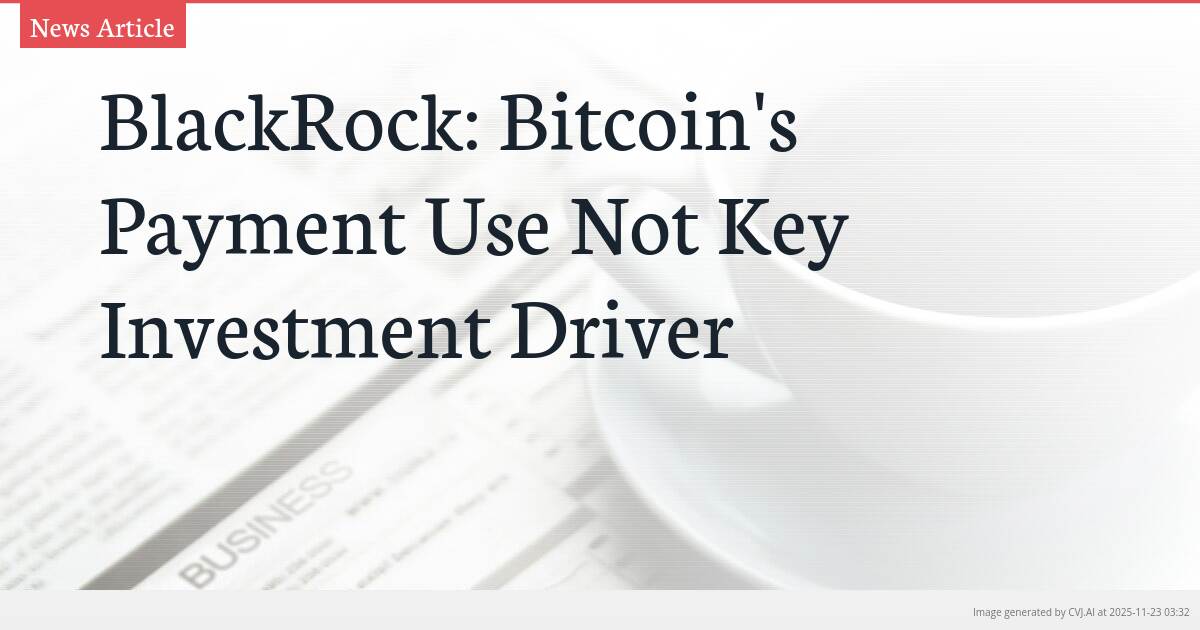Introduction
In a revealing podcast interview, BlackRock’s Head of Digital Assets Robbie Mitchnick has downplayed Bitcoin’s immediate potential as a global payment network, characterizing it as “out-of-the-money option value upside” rather than a core investment thesis. The world’s largest asset manager reveals that neither the firm nor its institutional clients are currently underwriting Bitcoin investments based on payment network capabilities, instead focusing on the cryptocurrency’s store-of-value properties and other fundamental characteristics. This perspective from a financial heavyweight provides crucial insight into how major institutions view Bitcoin’s evolving utility beyond current primary use cases.
Key Points
- BlackRock's institutional clients don't consider Bitcoin's payment potential when making investment decisions
- Bitcoin's payment network capability described as 'out-of-the-money option value' rather than core value proposition
- Reveals institutional focus remains on Bitcoin's store-of-value characteristics over payment utility
The Institutional Perspective on Bitcoin's Value Proposition
Robbie Mitchnick’s comments during the Friday YouTube podcast interview provide a window into how the world’s largest asset manager and its clients approach Bitcoin investment decisions. “I think for us, and most of our clients today, they’re not really underwriting to that global payment network case,” Mitchnick stated, directly addressing the common narrative about Bitcoin’s potential to revolutionize daily payments. This perspective from BlackRock’s digital assets chief carries significant weight given the firm’s position as a global financial leader with trillions in assets under management.
The characterization of Bitcoin’s payment network potential as “out-of-the-money-option-value upside” represents a sophisticated financial framing that institutional investors readily understand. In options trading terminology, an out-of-the-money option has no intrinsic value but carries potential for future gains if market conditions change dramatically. By applying this concept to Bitcoin’s payment utility, Mitchnick suggests that while the feature currently lacks practical value for institutional investment theses, it represents potential upside should global payment adoption materialize unexpectedly.
Why Payment Utility Isn't Driving Institutional Adoption
Mitchnick’s revelation that BlackRock’s clients aren’t considering Bitcoin’s use for daily payments when making investment decisions highlights a fundamental disconnect between popular cryptocurrency narratives and institutional reality. For major financial institutions and their clients, investment decisions require predictable returns, measurable risk assessments, and clear value propositions—criteria that Bitcoin’s current payment capabilities struggle to meet given scalability limitations, volatility concerns, and regulatory uncertainties.
The focus instead remains squarely on Bitcoin’s established characteristics as a store of value and potential hedge against traditional financial system risks. Institutional investors appear more interested in Bitcoin’s finite supply, decentralized nature, and historical performance as an uncorrelated asset than its theoretical potential to disrupt payment networks. This pragmatic approach reflects the risk management priorities that govern institutional capital allocation, where proven investment theses outweigh speculative technological possibilities.
BlackRock’s position also acknowledges the current competitive landscape in digital payments, where established systems and emerging central bank digital currencies present significant barriers to Bitcoin adoption for daily transactions. The computational limitations, energy consumption concerns, and transaction speed issues that have historically plagued Bitcoin’s payment functionality make it a challenging proposition against more efficient payment alternatives.
Implications for Bitcoin's Evolving Narrative
Mitchnick’s comments represent a significant moment in Bitcoin’s maturation as an asset class, demonstrating how institutional perspectives are shaping its fundamental investment story. The acknowledgment from a financial giant like BlackRock that payment utility represents optional rather than core value suggests that Bitcoin’s primary investment case is consolidating around its digital gold narrative rather than its digital cash aspirations.
This institutional framing could have lasting implications for how Bitcoin is regulated, valued, and integrated into traditional finance. If major asset managers and their clients continue to view Bitcoin primarily through a store-of-value lens rather than a payment technology framework, it may influence regulatory treatment, accounting standards, and portfolio construction methodologies. The separation of Bitcoin’s monetary properties from its technological capabilities allows institutions to evaluate it within existing financial frameworks rather than as a disruptive technology.
However, the “out-of-the-money option” characterization also leaves room for narrative evolution. Should Bitcoin overcome its technical and adoption hurdles for payments, institutions like BlackRock and their clients would capture unexpected upside while having built positions based on more conservative valuations. This approach allows institutional investors to participate in Bitcoin’s potential technological transformation while basing their investment decisions on more immediately verifiable characteristics.
📎 Source reference: cointelegraph.com

